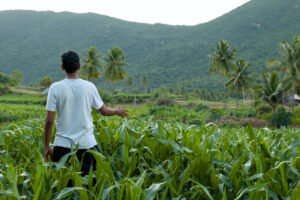Last month, US land investment magazine The Land Report published research indicating that Microsoft founder Bill Gates and his wife Melinda own the largest stock of private farmland in the US.
About 242,000 acres of it in fact, and part of a broader 269,000-acre land portfolio with holdings across 19 states, with the biggest chunks to be found in Louisiana (69,071 acres), Arkansas (47,927 acres), and Arizona (25,750 acres).
AFN‘s brief bulletin on the findings went truly viral, clocking up thousands of pageviews in a matter of minutes.
It’s safe to say it was a surprise to many that one of the US’s most recognized tech industry veterans is also now its biggest farm owner.
The question undoubtedly on many lips is: Why?
Much of the Gates’s land is apparently owned by Cascade Investment, the firm Bill set up to manage some of his vast fortune. Cascade’s single largest acquisition of farmland came in 2017, when it paid $520 million to purchase 61 properties from the Canada Pension Plan Investment Board (CPPIB), according to The Land Report. This parcel — which apparently makes up the bulk of the Gates’ farmland holdings — had previously belonged to the Agriculture Company of America, a real estate investment trust.
As to why they’d want so many farm acres — except for the long-term potential and relatively safe nature of the asset class — only a vague clue comes from the direction of Cascade. A spokesperson for the firm declined to comment on specific land holdings to The Land Report, except to say it is “very supportive of sustainable farming.”
Cascade also holds stakes in plant-based protein makers Beyond Meat and Impossible Foods, as well as agricultural equipment manufacturer John Deere. On both counts, there would appear to be some synergy with farmland there.
Beyond that, the Gates’s have backed a multitude of agrifoodtech startups — either through their private Bill & Melinda Gates Foundation or other investment vehicles — including crop protection companies AgBiome and Enko Chem, dairy data platform Stellapps, food waste reduction player Apeel Sciences, and ‘lab-grown’ meat maker Memphis Meats.
Bill has also taken the lead at Breakthrough Energy Ventures (BEV), a fund focused on climate change solutions, where he chairs a board featuring a veritable Davos of members including Amazon’s Jeff Bezos, Virgin’s Richard Branson, Tesla’s Elon Musk, Alibaba’s Jack Ma, SoftBank’s Masayoshi Son, and Mukesh Ambani of Reliance Industries.
BEV’s portfolio includes Pivot Bio, focused on in-field nitrogen fixation; plant-based novel ingredients producer Motif Foodworks; and Pachama, which collects and analyzes carbon sequestration data from forests. Bill penned a widely-read blog post on soil health back in 2019, indicative of his interest in some of these startups.
The Gates’s are also active proponents of agricultural development in Africa with a keen interest in the potential for agtech in the region. Their funding for ag-related projects on the continent has included at least $100 million granted to the Alliance for a Green Revolution in Africa, which aims to enhance smallholder productivity using science and technology. The Gates Foundation also invested $20 million in the International Rice Research Institute, which is working on fortified rice varieties, between 2007 and 2010.
And last month, the Bill & Melinda Gates Foundation announced that it’s creating a new nonprofit entity called Bill & Melinda Gates Agricultural Innovations, LLC — or Gates Ag One, for short — which will seek to “speed up efforts to provide smallholder farmers in developing countries, many of whom are women, with access to the affordable tools and innovations they need to sustainably improve crop productivity and adapt to the effects of climate change.”
Given all this, one might assume that the Gates’s intention is to turn their estimated 242,000 farm acres into the world’s biggest testbed for ag, food, and climate-related techniques and technologies.
Surely, that’d be a good thing? After all, Bill and Melinda have a history for philanthropy, and are obviously personally invested in sustainable development.
But many people will take some convincing that the Gates’s can be good for ag.
To say that the couple divide opinion is an understatement. Despite his nerdish image, Bill courted plenty of controversy while heading up Microsoft in the 1990s and early 2000s. The software company developed a reputation for having a ‘crush the competition’ mindset – a reputation that wasn’t undeserved, given that antitrust agencies in the US, EU, and elsewhere took it to task more than once.
This, along with its high-profile patent lawsuits targeting the open-source Linux operating system, meant that Microsoft — and Bill, by extension — came to be seen by many as miserly with regards to intellectual property, collaboration, and open innovation (Steve Ballmer, who replaced Gates as the company’s CEO in 2000, infamously described Linux as a “cancer” – though he has since revised his opinion.)
Beyond the rich, nutty seam of conspiracy theory that accompanies any mention of the Gates’s, there are many meaningful cries of caution and concern about their farmland ownership.
“I spend a lot of time thinking about the divide between rural and urban societies. We celebrate information technology because it has served to empower those that can afford access to that information,” one rancher wrote in a social media post, referring to the Gates’s farmland dominance and the broader encroachment of ‘Big Tech’ into ag.
“As we applaud Apple, praise AI, and expound on the liberating potential of robotics, we forget [that] 47% of the world still doesn’t have internet access.”
Another social media commenter wrote that, while they weren’t commenting on the Gates’s specifically, “too much farmland is now investor-owned [with] speculation on land values increasing.”
This echoes a critique previously leveled at CPPIB’s prodigious acquisition of farmland – most of which ended up in the hands of the Gates’s.
“If they insist on cash rent too, that’s also a problem,” the commenter continued. “Whatever happened to landowners sharing the risk of a bad season with the tenant?”
“I hope they are not just owners, but stewards,” another said of the Gates’s.
So perhaps it isn’t the Gates’s land ownership specifically that we should be fearful of. Rather, we should be wary the fact that so much of our farmland — so critical to the production of our food and the maintenance of our environment — can end up in the hands of just one or two people.
In other words: Imagine if it wasn’t the Gates’s, but someone else? Better the devil you know…
In any case, what Bill and Melinda and their extensive network of entrepreneurs, innovators, and businesspeople have is an opportunity to create the world’s largest sandbox for testing out new agricultural and food technologies. But they’ll need to win some hearts and minds along the way.
Comment? News tip? Story idea? Email me at [email protected] or find me on LinkedIn and Twitter





